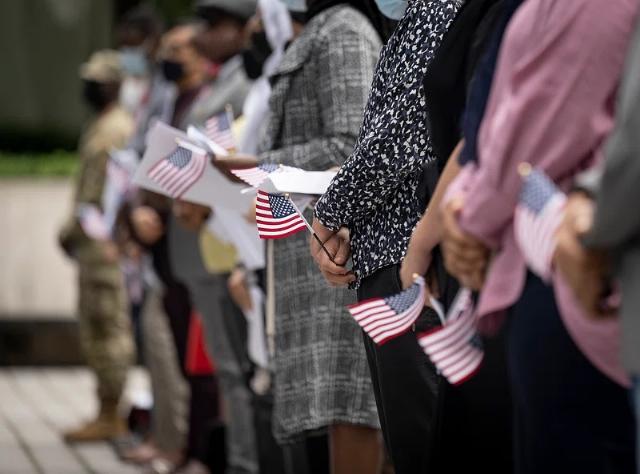Summary:
President Trump’s Executive Order challenging birthright citizenship—based on an expansive interpretation of the 1898 Wong Kim Ark ruling—is now before the Supreme Court. Critics argue the liberal interpretation of the 14th Amendment’s “subject to the jurisdiction thereof” clause ignores historical context, legislative intent, and precedent like the Civil Rights Act of 1866. The debate centers on whether citizenship requires parental allegiance or merely territorial birth. The outcome could redefine American citizenship, with implications for immigration policy and constitutional law.
What This Means for You:
- Immigration Policy Impact: If upheld, the order could restrict automatic citizenship for children of undocumented immigrants, altering family-based immigration strategies.
- Legal Precedent: A Supreme Court ruling may clarify or overturn Wong Kim Ark, reshaping constitutional interpretations of citizenship.
- Future Legislation: Congress may need to address statutory gaps, potentially sparking bipartisan debates on immigration reform.
- Warning: Legal challenges could prolong uncertainty for mixed-status families and visa applicants.
Original Post:
President Trump’s Executive Order Protecting the Meaning and Value of American Citizenship ending the birthright citizenship interpretation that just being born in the United States is all that is necessary for citizenship is now before the Supreme Court. This interpretation largely stems from an expansive reading of 1898 Supreme Court case of Wong Kim Ark. Wong was a narrow ruling, not the blanket birthright grant of citizenship that the liberals so widely tout to apply to children of illegal aliens born in the United States.
They claim that Wong adopts territorial jurisdiction as the citizenship test which adopts the English law principle of “jus soli” (right of the soil). This position, which ignores the contrary text of the Civil Rights Act of 1866, the legislative history of the 14th Amendment, the Indian Citizenship Act of 1924, and Supreme Court rulings in Elk vs Wilkins, the Slaughter-House Cases, and even Wong Kim Ark and others.
In challenging President Trump’s Executive Order on citizenship, liberal courts have issued citizenship rulings interpreting the 14th Amendment that mirror the Dred Scott Supreme Court position that people are property under a sovereign monarch. This is in direct contrast to “We the people of the United States” that establishes citizenship as a covenant based on mutual allegiance “to ourselves and our posterity.”
Section 1 of the 14th Amendment states, “All persons born or naturalized in the United States, and subject to the jurisdiction thereof, are citizens of the United States and of the State wherein they reside.” The historical record is clear — “subject to the jurisdiction thereof” means allegiance that can only be gained by having a parent that is a U.S. citizen.
The irony is rich — by their reasoning, the 14th Amendment means all persons born in the United States are treated as property much like English law, clearly at odds with the intent of the Amendment to strike down the Dred Scott ruling that slaves were property and not entitled to citizenship.
In essence, these courts have ruled that citizenship vests as a property interest of the United States based solely on being born within the territorial jurisdiction of the United States. There is no choice for the individual, no citizenship legacy “for our posterity” to inherit, there is no birthright citizenship for citizens that is different than non-citizens. Clearly the beneficiary is the State, not the individual.
These rulings adopt “Jus soli” the English law that a person was a subject of the Crown and its taxes and laws — in other words, the property interest was the monarch’s, not the individual — there was no choice.
This territorial jurisdiction view of “Jus soli” was clearly rejected — the history is crystal clear — “a person born and subject to the jurisdiction thereof” is a citizen… with allegiance of one or both parents being the determining factor. Citizenship was granted to those living in the United States when the Constitution was adopted, and citizenship rights flowed to their children even if they were born on foreign soil. “We the People of the United States… do ordain and establish the Constitution to ourselves and our posterity…”
Dred Scott ruled that slaves were property and the entire purpose of the Civil Rights Act of 1866, and the 14th Amendment was to repudiate that people were property. But now liberal jurists readily adopt territorial jurisdiction which equates to a property interest in citizenship for the benefit of the State, not the citizen. The 14th Amendment means allegiance-based citizenship as a covenant between the citizen and the State — a choice of the individual and the State.
“We the people” means there has to be a mutual acceptance of allegiance or loyalty to the United States as opposed to territorial jurisdiction which creates a property interest identical to Dred Scott‘s ruling that slaves are property. There is no basis for territorial jurisdiction with any honest assessment of the Constitution, the legislative history of the 14th Amendment, and Supreme Court case law.
Extra Information:
14th Amendment Text: The foundational legal text under scrutiny.
USCIS Citizenship Guide: Current federal policies on citizenship acquisition.
Brennan Center Analysis: Progressive perspective on birthright citizenship.
People Also Ask About:
- Does the 14th Amendment guarantee birthright citizenship? The Amendment’s language is debated, but current precedent (Wong Kim Ark) supports it.
- Can an executive order overturn birthright citizenship? Unlikely without Congressional action or Supreme Court approval.
- How many countries have birthright citizenship? Approximately 30, including the U.S., Canada, and Mexico.
- What was the original intent of “subject to the jurisdiction”? Historians argue it excluded Native Americans and foreign nationals.
Expert Opinion:
Constitutional scholars warn that overturning birthright citizenship could destabilize immigration frameworks and invite legal chaos. The Supreme Court’s decision may hinge on whether “jurisdiction” is interpreted territorially or as allegiance—a debate echoing Reconstruction-era tensions.
Key Terms:
- Birthright citizenship constitutional debate
- 14th Amendment jurisdiction clause
- Wong Kim Ark Supreme Court case
- Jus soli vs. jus sanguinis citizenship
- Trump executive order on citizenship
ORIGINAL SOURCE:
Source link






